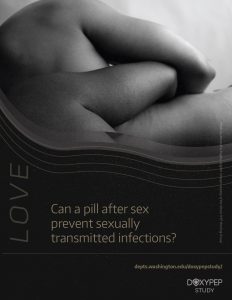The DoxyPEP study is now closed to enrollment. If you are a current or former study participant, please reach out to the study team for more information.
There has been an alarming global increase in bacterial STIs particularly among men who have sex with men and transgender women. One potential approach is post-exposure prophylaxis (PEP) with an antibiotic that is effective against bacterial STIs.
We have preliminary findings from a 2017 French study called IPERGAY that doxycycline taken 24-72 hours after condomless sex as post-exposure prophylaxis (PEP), reduced new cases of syphilis and chlamydia by 70% but had no effect on reducing gonorrhea. Over half of gonorrhea is resistant to doxycycline in France and about one quarter of gonorrhea in the US is as well.
In order to guide policy about doxycycline PEP for STI prevention, we need more information about doxycycline PEP’s effectiveness, safety and effect on antimicrobial resistance in both men who have sex with men (MSM) and transgender women (TGW) living with HIV, in addition to MSM and TGW on PrEP.
We designed the doxyPEP study to learn whether doxycycline PEP reduces new syphilis, chlamydia and gonorrhea infections among MSM and TGW on PrEP and those living with HIV. We also are studying the effect on antimicrobial resistance, specifically whether intermittent use of doxycycline as PEP leads to resistance in gonorrhea, chlamydia and syphilis, Staph Aureus and other bacteria that we commonly carry.
There’s a couple key things we want to know:
- Does doxy PEP work to reduce bacterial STIs among MSM and TGW?
- Is it safe and well-tolerated?
- Does doxy PEP cause drug resistance?
